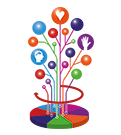
Self-management and study skills are the most individual skills to develop. It is your responsibility to develop them, which does not mean that you should forgo the support of tutors or peers. The most important yardstick for measuring your performance in study skills and self-management is their effect on the other skills in the Skill Circle. It takes considerable time and critical self-diagnosis to develop study and self-management skills. They are a mixture of input and output categories.
Your aims and priorities change over time, as you reach higher levels of understanding and skill proficiency. The challenge of lifelong (self-managed) learning is to continuously trigger cycles of so-called generative or ‘double-looped’ learning. This requires that you be prepared to go through the reflective cycle of lifelong learning, and that you always take into account five basic principles that apply when you want to make your study part of a continuous learning cycle.
- Assume responsibility for your own learning.
- Be active and intrapreneurial.
- Dare to put yourself in the discomfort zone.
- Create your own learning environment – participate in extracurricular activities.
- Generate as much relevant feedback as possible: get a coach or tutor.

